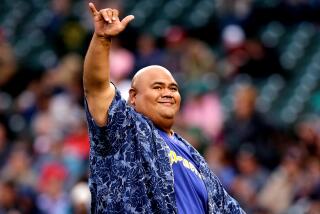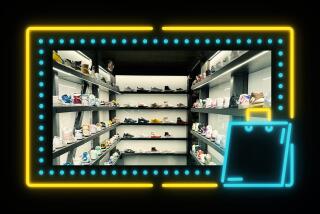Waltah Clarke, 89; Brought Style of Hawaii to Mainland Fashion
- Share via
Waltah Clarke, who introduced Hawaiian apparel to the mainland in the early 1950s and was once the nation’s largest retailer of aloha wear, has died. He was 89.
Clarke, founder and president of Waltah Clarke’s Hawaiian Shops, died of heart failure Tuesday at a hospital in Rancho Mirage, where he and his wife, Gretchen, lived the last 28 years.
For the record:
12:00 a.m. May 12, 2002 For The Record
Los Angeles Times Sunday May 12, 2002 Home Edition Main News Part A Page 2 A2 Desk 2 inches; 41 words Type of Material: Correction
Clarke obituary-Waltah Clarke’s obituary in Saturday’s California section incorrectly stated the time of his memorial service. It is scheduled at 2 p.m. Monday at Ramon Chapel of Palm Springs Mortuary in Cathedral City. The retailer of Hawaiian apparel died Tuesday in Rancho Mirage at age 89.
Clarke, a Los Angeles native who moved to Hawaii in 1938, opened his first store in Palm Springs in 1952. By 1980, there were 31 Waltah Clarke Hawaiian Shops, including those in Laguna Beach, Newport Beach, Beverly Hills, Pasadena, Palm Beach and Chicago, as well as 17 locations in Hawaii.
In the 1950s, Waltah Clarke’s was the place to go for Hawaiian shirts, swimwear and the ever-popular muumuu.
“They took off like gangbusters,” said Gretchen Clarke, who designed most of the exclusive prints and garments for the company. In the 1960s, she said, “we sophisticated the muumuu and made it into more of a fashion garment--cocktail dresses and resort wear--and not just a baggy dress.”
Their ad at the time said: “We’ve come a long way from the muumuu, baby.”
And, she said, “When the miniskirts came in, we shortened it to above the knee. We called it ‘the mini muu.’ All the young girls bought it. We were innovative and kept up with the trends, but always with the Hawaiian flair.”
“They were very capable business people, Waltah and Gretchen,” said Tim McCullough, president and chief executive of Reyn’s, a longtime apparel retailer and manufacturer in Hawaii.
“They need to be credited with bringing what we would call today luau kitsch to the forefront of the mainstream marketplace,” McCullough said. “At the time, they were quite progressive. Their designs and styling were done very tastefully for the period and their product was very bold.”
In 1975, Hawaii’s Gov. John A. Burns awarded the Clarkes a special citation of merit for their “substantial contribution to the economic development of Hawaii.”
Born in Los Angeles in 1912, Clarke graduated from USC with a liberal arts degree. He moved to Hawaii in 1938.
“He flipped a coin--Paris or Hawaii--and Hawaii came up,” his widow said.
Soon after arriving in Hawaii, Clarke met restaurateur Vic Bergeron and learned the restaurant business managing the Trader Vic’s restaurant in Honolulu. Then Clarke met another legendary restaurateur, Donn Beach, for whom he served as general manager and publicity director for his Don the Beachcomber restaurants.
An eye problem kept Clarke out of military service during World War II.
After the war, Clarke became an official ambassador of aloha, along with Duke Kahanamoku, for the Hawaiian Visitors Bureau.
Clarke also began writing a weekly gossip column, “Hawaiian Holidays,” which appeared in the Los Angeles Times, the Chicago Tribune, the San Francisco Chronicle and other newspapers.
Clarke’s base of operations was the Royal Hawaiian Hotel, a magnet for socialites and Hollywood celebrities whose activities he chronicled. His business card read, “Royal Hawaiian Beach, 3rd umbrella from the left.”
Heavily boosterish for the islands, which were a decade away from becoming a state, Clarke ended each column with a weather report: “Gosh!” he wrote in one, “The weather’s been beautiful lately ... typically winter, with bright blue skies, hot sun and spun-sugar clouds. Just perfect for travel to the islands.”
“He learned the business of all things Hawaiian mostly from Don the Beachcomber,” said Gretchen Clarke. “He became so fascinated with Polynesian life--the customs, the music, the flowers and the whole attitude of Hawaii, the aloha spirit--he decided to bring that to the mainland through stores.”
Clarke, who always loved the desert, opened his first Hawaiian clothing store in the landmark El Mirador Hotel in Palm Springs in 1952.
On a buying trip to Hawaii in 1953, he met Gretchen, a recent Northwestern University graduate who had studied textile design, in the lobby of the Royal Hawaiian Hotel, where she and her parents were staying. They were married the next year.
Clarke’s move into the El Mirador Hotel was “an instant success,” said Gretchen Clarke. “We made enough money to keep opening stores every year.”
When Disneyland opened in 1955, she said, “We were there.” In 1956, they moved out of the El Mirador and opened a shop on Palm Canyon Boulevard in Palm Springs, where it was a fixture for 36 years.
After about 10 years of adding mainland stores to their chain, Gretchen Clarke said, they opened their first store in Hawaii--at the Ala Moana Shopping Center--and spread to the major hotels on the outer islands.
Waltah Clarke always handled the promotion and publicity for their company.
Clarke had changed the spelling of his name from Walter to Waltah because that’s how the Waikiki beach boys pronounced it when he arrived in the islands. Clarke retired a decade ago, appointing his wife president of the company while he continued to serve as chairman of the board. They sold their last store, in Palm Desert, last year.
In addition to his widow, Clarke is survived by children, sons Walter Jr. of Honolulu, Rolf of Irvine, and Cameron of Washington, D.C.; daughters Heather Salsbury of Los Angeles, Gretchen Clarke of Eureka, Mont., and Cissy Milauskas of Los Angeles; and six grandchildren.
Services will be held at noon Monday at Ramon Chapel at Palm Springs Mortuary in Cathedral City.
The family suggests that any donations be made to Tiempo de Los Ninos at Desert Regional Medical Center in Palm Springs or the American Cancer Society.






